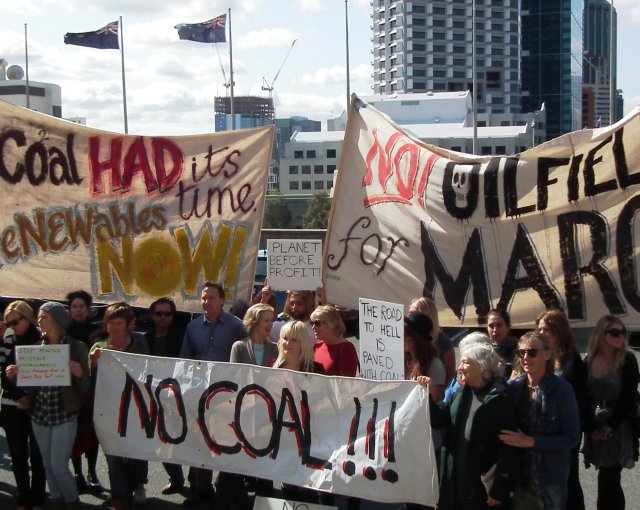
Rich Land, Wasteland
Sharyn Munro
Exisle Publishing & Pan Macmillan
453 pages, pb, $29.99
When a coalmine starts up near a township, a village or a farm it is to be expected that lives will change.
Indeed change is often promised and welcomed ― more Jobs, more money flowing into the community, better roads and services. In short, progress is promised.
The reality, however, is that not only do the benefits not evolve as the mines begin their operations, they destroy the land, pollute the water and air, erode people's physical and emotional health and rip up the social fabric.
The media lead us to believe that Australia's wellbeing depends on the mining sector. The more minerals that are exported, the healthier the Australian economy is and the better off we are.
But such stories hide the real impacts of mining from most Australians.
Sharyn Munro puts aside “the diversionary cloud of spin” and tells the real story of coal mining. A resident of the upper Hunter who saw the coal mines taking over vast tracts of that valley, she spent a year travelling to the different parts of Australia where coalmining is destroying communities, livelihoods and ecosystems.
She found that “coal is killing Australia”.
Meeting victims of the industry in NSW, Queensland, Victoria, in WA and Tasmania, she records their stories. In Rich Land, Wasteland, she lets them tell their side of the story.
They tell us that there is “a war taking place in Australia”. It is an invasion where “the invaders are mostly foreign or multinational”. It looks like the second invasion of the continent.
The victims of this war, the people harassed and displaced by the mines, are fighting the invasion and mostly they have been fighting alone. They live in smaller communities or on the land, isolated from neighbours by distance and by the mines' strategies of divide and take over.
All are deeply shocked by the lack of support from the governments and the legal system.
With their health, properties and livelihoods on the line, they try to stand up against the wealthy opponents.
The “warring sides are more unevenly matched than any David and Goliath cliche can convey”, the book says. Most of them have taken the fight up reluctantly. But if they are not despairing early on, they get increasingly incensed by the injustice they experience.
All are disillusioned, if not deeply depressed, by the failure of democratic processes.
Occasionally, they win a small concession ― only to be wiped out again by the mining companies' blatant disregard of the conditions placed on their operations or by changed government regulations.
Where the invasion has been beaten off, as in the Margret River region in WA, the attackers regroup a short distance away, where they hope resistance will be weaker.
Each of the individual stories Munro presents is underpinned with meticulously researched facts and figures. Judiciously inserted at relevant points, these expand the anecdotal evidence into a systematic documentation of the true impact of coalmining.
In some sections, the seemingly obvious becomes a revelation.
Take the impact of dust. From the blasting and machinery working in open cut mines, to vast piles of overburdened, uncovered coal trains up to two kilometres-long on their way to the ports and fly-ash from the coal power stations, it negatively affects the health of people, animals and plants.
The dust consists of smaller and larger particles of lead, arsenic and mercury, which are inhaled and ingested by animals and humans. Its role in higher rates of health problems such as asthma have been proven, yet the government does not act.
Contrary to the findings and advice of medical experts, governments assures residents they have nothing to fear. In 2010, the Independent Review of Cumulative Impacts on Camberwell (Hunter) “dismissed fears mines are making people sick”.
The report advised people to stay inside, close doors and wear masks, put on air-conditioners and seek medical advice.
Conditions placed on mining operations, such as to reduce dust, are hardly ever monitored ― except by the mining companies themselves. Their results never surprise.
There are many more, widely varied aspects to this war. These include issues such as ownership of mines and who benefits, the fast and huge expansions of coal mining as well as coal seam gas exploration and extraction, collusion of mine operators and government agencies, strategies applied to move people out of the way of mines, the impact of the predominantly male fly-in-fly-out workforce, higher road traffic, new exclusive rail lines and shipping in the Great Barrier Reef.
Everywhere there is environmental destruction, a lack of ― indeed the impossibility of ― site rehabilitation, and water depletion and water contamination. Everywhere, it poses the question: how can this happen in a democratic country such as Australia?
With so many details, an index would help reading and following up on some facts. The subheadings to the chapters that list locations help only to a point. I would have liked a list of acronyms and some maps.
However, when turning to the internet to look for the locations, I found that satellite maps gave extra insights into the vast onslaught of coal mines on the country.
Reading this book, veil after veil is lifted, revealing the reality of Australia today. It could be a deeply depressing book, if it weren't for the encounters with many individuals who are standing up and speaking out.
As one says, “you must fight or nothing happens”. Munro encourages the readers to add their voices, stop the plunder and “speak up for the smart, sustainable and humane Australia we could be instead” ― the country worth fighting for.

Comments
Anonymous replied on Permalink
Anonymous replied on Permalink